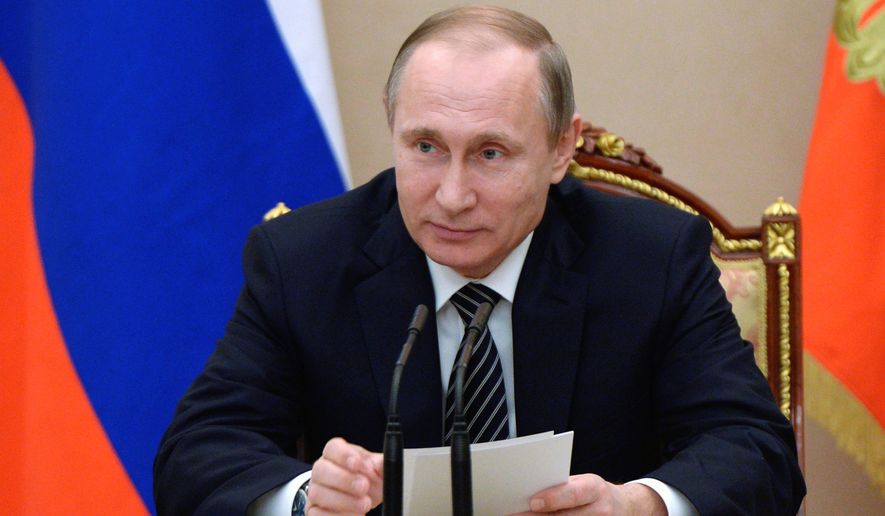ANALYSIS/OPINION:
Ever since sanctions were imposed on Russia following the annexation of Crimea and the start of the conflict in eastern Ukraine, it has been the Kremlin’s strategy to wait out the West, based on a divide-and-conquer approach to the countries of Europe. We now may be seeing that strategy start to pay dividends.
In case you haven’t noticed, the price of crude oil in global futures markets is rising. It seems the reduction of supply so desperately needed to push oil prices higher is finally happening. All the talk of production caps and market collusion between Russia and the OPEC cartel is having an effect, even if it has been just that — talk.
While the world has been focused on Syria and the U.S. presidential election, the projected price for crude is approaching $50 a barrel. Oil is now the lifeblood of the Russian economy. The Kremlin has budgeted for a $50-a-barrel price and adjusted its spending plans accordingly. Russia can get by — at least for several years — on $50 oil, in the hope that the price will eventually move higher. Russia can’t cut it for very long at $30 a barrel.
President Vladimir Putin and his top Kremlin aides have been shrewd in manipulating international markets to their advantage, with a rumor here and a rumor there of production cuts and supply disruptions. The truth is, Russia is still increasing output. As the price of crude rises, this will help replenish its foreign currency reserves and give the Kremlin vital breathing room.
The prices are turning around as European support for the sanctions against Russia is weakening. The French National Assembly on Thursday adopted a resolution calling for an end to the sanctions against Russia, concluding that the sanctions have hurt French economic interests without forcing Russia to end its backing of pro-Moscow separatists in Ukraine. France is also calling for a partnership with Russia in the fight against terrorism, after the attacks by the Islamic State in Paris. French and Russian forces have been working together in the Middle East to target Islamic State fighters.
Although I am sure the Kremlin is not pleased with Donald Trump’s comments on rebuilding U.S. military power, there must have been smiles in Moscow when Mr. Trump, in his much-touted foreign policy address this week, said it is not inevitable that Russia and the United States be adversaries.
This could mean that Mr. Trump is considering another U.S.-Russian “reset” in an attempt to restart relations with Mr. Putin and the Kremlin’s power structure, moving beyond the sanctions-driven policy of President Obama. Mr. Trump has shown a respect for Mr. Putin not seen in the Obama administration, which frequently mocks the Russian economy, derides Mr. Putin’s “slouch” and generally dismisses Moscow as a third-rate regional power vainly chasing lost glory.
Obviously, Mr. Obama’s approach is not the way to cement better relations with the Russian Federation. Confronting Russian aggression is one thing, but needlessly mocking the leader of a nuclear power is unnecessary, petty and — worst of all — unproductive. The world has come to expect nothing less from the Obama administration and its amateur-hour foreign policy. One might say Mr. Trump is acting more presidential than the current occupant of the Oval Office.
In any event, it seems the pendulum is swinging in the Kremlin’s direction on a variety of levels. Barring another collapse in the price of crude, it seems the Kremlin can hold on to power for the foreseeable future, the economic hardships still facing ordinary Russians notwithstanding.
Although the Obama administration wants the sanctions against Russia to stay in place as long as the international deal on Ukraine is not fully implemented, it seems the Kremlin will continue to sow divisions in Europe while waiting for a new administration in Washington. Some Russian oligarchs have even made a lot of money from the sanctions, replacing goods formerly imported from Europe with domestically produced substitutes. Like the Kremlin, they may not mind living with the status quo for a good while longer.
• L. Todd Wood, a former U.S. military helicopter pilot and Wall Street debt trader, is a contributor to Fox Business as well as the National Review and many other publications. He can be reached through his website, LToddWood.com.
• L. Todd Wood can be reached at ltwood@123washingtontimes.com.




Please read our comment policy before commenting.